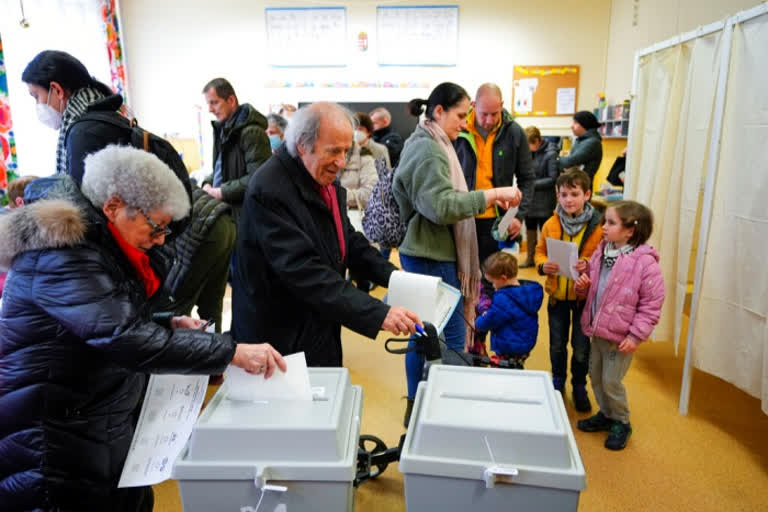Budapest: Hungarians flocked to polling places on Sunday as voters in the Central European country faced a choice: take a chance on a diverse, Western-looking coalition of opposition parties, or grant nationalist Prime Minister Viktor Orban a fourth consecutive term in office. The contest is expected to be the closest since Orban took power in 2010, thanks to Hungary's six main opposition parties putting aside their ideological differences to form a united front against his right-wing Fidesz party.
Recent polls suggest a tight race but give Fidesz a slight lead. Analysts have predicted high turnout, and around 40% of Hungary's nearly 7.7 million eligible voters had cast a ballot by 1 p.m., according to the National Election Office. Opposition parties and international observers have pointed out structural impediments to defeating Orban, highlighting pervasive pro-government bias in the public media, the domination of commercial news outlets by Orban allies and a heavily gerrymandered electoral map.
The Organization For Security and Cooperation in Europe sent a full observation mission to Hungary to monitor Sunday's election, only the second time it has done so in a European Union country. Speaking at a polling place in a wealthy Budapest neighborhood, the head of the OSCE mission, Ambassador Jillian Stirk, said the group's assessments would be based "on the facts that we observe, from what we see and what we hear. So we don't come with any kind of preconceived ideas." Gabor Somogyi, a 58-year-old marketing professional, said after voting that he believes that Hungary's media environment favors Orban and Fidesz, and has made the election unfair.
"I really count on the monitoring. It's fine, I'm happy with that. But I don't really believe (the election) will be clean enough. Even the campaign was not clean enough," Somogyi said. Yet despite what it calls an uneven playing field, the six-party opposition coalition, United For Hungary, has asked voters to support its efforts to introduce a new political culture in Hungary based on pluralistic governance and mended alliances with the EU and NATO.
The coalition's candidate for prime minister, Peter Marki-Zay, has promised to bring an end to what he alleges is rampant government corruption, and to raise living standards by increasing funding to Hungary's ailing health care and education systems. After voting along with his family in his hometown of Hodmezovasarhely, where he serves as mayor, Marki-Zay on Sunday called the election an "uphill battle" due to Fidesz's superior economic resources and advantage in the media but he knows "there are more people that want change in Hungary."
"We are fighting for decency, we are fighting for the independence of the judiciary and the rule of law in Hungary," Marki-Zay said. "We are fighting for the whole world. We want to show that this model that Orban has ... introduced here in Hungary is not acceptable for any decent, honest man." Orban — a fierce critic of immigration, LGBTQ rights and "EU bureaucrats" — has garnered the admiration of right-wing nationalists across Europe and North America. Fox News host Tucker Carlson broadcast from Budapest for a week last summer, where he extolled Orban's hard-line approach to immigration and the razor wire fence he erected along Hungary's southern border.
